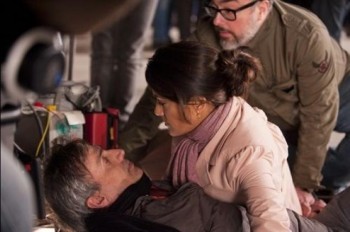
EFE New York 24/04/2012
The Spanish film director Alex
de la Iglesia, who presented his new film "As Luck Would Have it"
in the Tribeca film festival in New York, told news agency EFE
today that his films "have more life abroad than in Spain", and
that new markets have to be opened, for example, "through the
internet".
De La Iglesia gave a chat at the
Cervantes Institute with Spanish film-makers Alberto Rodriguez and
Martin Rosete, who are taking part in Tribeca with their films,
"Group 7" and the shortfilm "Voice Over" respectively, along with
the star of "As Luck would have it", actor and comedian Jose
Mota.
"To be in Tribeca is a real treat
and a success, because it is one of the most important independent
film festivals in the world. Very select product is presented here,
it´s really tough to get in, and the fact that there are three
Spanish films here is a good example that there is a place for our
cinema", asserted De La Iglesia in declarations to Efe.
"It shows that, despite the cuts,
we are still fighting, and that our films do work; it is important
people from other countries tell us, people from outside Spain,
because if you say it, no one believes you."
The film-maker (Bilbao, 1959) also
noted the need to "open up new markets and not lock oneself down in
films which are no more than national, because distribution is
still outstanding business for the industry."
In this regard, the ex-president of
the Spanish Film Academy pointed to internet as an alternative
exploitation model, arguing it should be seen "an an opportunity
and not a site of confrontations, allowing as it does films to be
made known with the same possibilities as the majors'
productions."
"We should be just as quick to
present films on internet as we do to screen them at festivals like
Tribeca, because that market is going arrive sooner or later, it is
going to happen, and we have the opportunity, we film-makers, who
are not Hollywood, to be the first to open up the market" said
De La Igelsia during the chat.
Likewise, de la Iglesia underlined
the interest which Spanish film arouses in the rest of the world,
the reason being that "more and more we make films thinking in the
international market, with films being able to contribute to
selling the Spanish brand, reflecting what we are, our
cosmo-vision, something the United States has done very well with
its industry...
An internationalization effect
which, according to De la Iglesia, finds a good example in the
appearance of stars Jose Mota and Salma Hayek in the leading US
newspapers on account of the film´'s presentation.
"I´m not surprised, you could see
it coming", joked Mota (1965) during the event, explaining to news
agency Efé that playing a dramatic role was a "challenge" which he
liked the idea of taking on. The actor, popular for his comedy
roles underlined that "film should move people, making them laugh
or cry, and that with this character, he had the chance "to tell an
emotional story and be a mouthpiece in order to denounce things
like the economic crisis, unemployment, making people liisten".
The film tells the story of a man
who loses his job and Mota highlighted that the "economic crisis
sharpens the wits - the best cinema I have seen was that which came
out of Argentina at the height of its economic crisis and its
capital flight ban. At least, that is what I like to think,
otherwise we may as well just hang ourselves."
[...]
Marta Quintín.